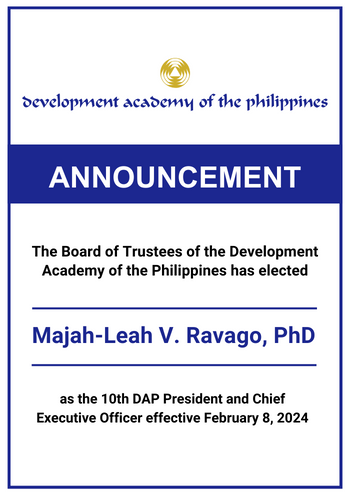Strong institutions, accountable governments, disciplined citizens as well as participatory governance play a big part in a country’s long-term growth and development.
This was the gist of the messages delivered by resource persons Dean Ronald Mendoza of the Ateneo School of Government and Director Aida Maria Talavera of the Commission on Audit during the Development Academy of the Philippines’ Kartilya Session entitled “Citizen-Engaged Governance” last April 6 at the DAP headquarters in Pasig City.
Mendoza presented a cross-country comparison of economic setbacks and recoveries in Malaysia, Indonesia, and the Philippines and pointed out that a country recovers faster when its institutions are strong because they serve as an economic foundation for that country. He said that institutions or behavioral norms, values and unwritten rules play a big part in a country’s long-term growth and development.
Plans and policies not enough
Mendoza further explained this by stressing that plans and policies alone do not make a country prosperous if there is continuous corruption and “rent-seeking” in the government – a practice where individuals or companies secure certain projects, positions or protection by virtue of connection to government officials in return for political support or campaign funds – or there is a lack of discipline on the part of the citizens.
Development and stability, he said, occur when they are built on the foundation of transparent and accountable governments, disciplined citizens, and a stronger social cohesion and sense of community in the country. Thus, in order to build this kind of institution over time, Mendoza affirmed that it is imperative to continually push for improving transparency and participatory governance.
Talavera, on the other hand, presented an example of a participatory governance project in discussing citizen-participatory audit or CPA, which involves civil society organizations and citizens as partners in auditing government projects at the grassroots level.
‘Stronger and wiser when together’
“Government and civil society are stronger and wiser when working together and this has served as the core philosophy of the CPA,” she said.
Talavera then cited some best practices such as the audit of a farm-to-market road project in Palawan. The CPA, which won the 2013 Bright Spot award at the Open Government Partnership Summit in London, is deemed to be the first of its kind in the world.
DAP Senior Vice President for Services Bernardo Dizon had opened the session by saying that citizen-engaged governance aims to ensure representation, empowerment, accountability and transparency in the government. “When citizens are involved in the government, they feel more valued, more empowered, and more active in contributing to the country’s development, which will result in an increase in citizens’ satisfaction and a better quality of life,” he said.
The Kartilya Session on citizen-engaged governance was attended by 32 participants from different public sector agencies. It is the fourth installment to the Productivity Series that aims to stimulate thinking and spur collaboration between public sector agencies and other stakeholders on issues that are key to improving public sector productivity. – Jen Flores




